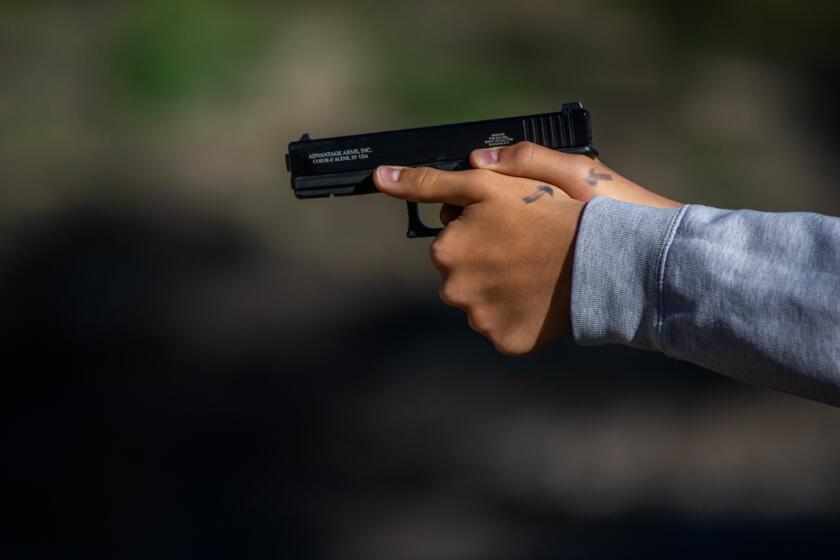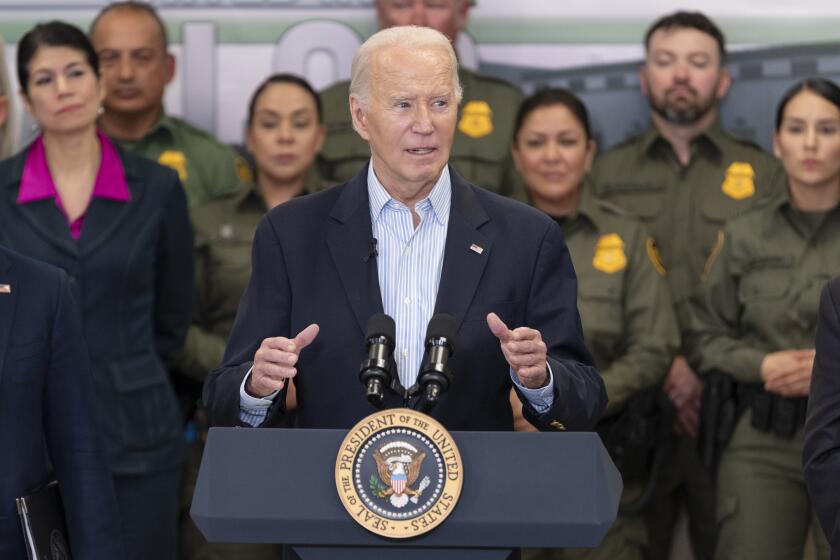There’s a new reason your neighbors bought a weapon — gun culture 3.0

- Share via
The rumors and conspiracy theories in Hurricane Helene’s wake came armed and dangerous: Government relief was a green light for property confiscation; funds had immediately run dry; the storm itself had been engineered by the government for the benefit of Kamala Harris’ campaign. Meterologists suffered death threats. In North Carolina, FEMA workers stopped knocking on doors out of fear that militia members were after them. In Tennessee, a church-group volunteer stood between federal helpers and angry open-carry gun-toting locals. And at least one arrest, of a man armed with a rifle and a handgun, took place in North Carolina.
The paranoia in hurricane country, with its undercurrent of violence, is just the latest sign of a new wrinkle in American gun ownership, something scholars have started describing as gun culture 3.0. The 1.0 version is firearm ownership based on hunting, often animated by a mythologized Western frontier. Gun culture 2.0 is self-defense-oriented, motivated by overwhelming concerns about violent crime that emerged in the 1960s. For years, gun-owning Americans have told pollsters that the No. 1 reason they own guns is to protect themselves in dangerous situations.
Vem Miller, 49, was arrested on gun charges Saturday after deputies found loaded guns in his car. He filed a defamation suit Tuesday against Riverside County Sheriff Chad Bianco.
But that broad motivation conceals a shift in what many — though not all — gun owners feel they now need protection against. Borrowing from the militia movement, which identifies government tyranny as a key reason for firearms ownership, Gun culture 3.0 is all about perceived political threats unleashed by those no longer invested in normal guardrails — whether rogue government agents or rogue private individuals.
Of course, gun culture 3.0 raises the question of what will happen after Nov. 5. Regardless of what the American electorate does on election day, it’s hard to imagine a scenario that doesn’t enable violence.
In fact, it has already begun.
In Arizona, where I live, the Democratic Party office in Tempe was shot up three times over the last two months — and closed this month, its staff worn down by the threat of sprayed bullets. In Pima County, the Democratic office reset its public hours in light of incoming violent threats. Election workers scared for their lives are so common now, the change hardly made news.
Tom Nguyen had a toxic relationship with guns most of his life. But early in the pandemic, he slowly amassed a following as a liberal-minded firearms instructor focused on helping gun-averse Angelenos learn how to handle firearms properly, without having to engage the gun culture they abhor.
Meanwhile, two assassination attempts against former President Trump almost feel unremarkable. Even the near-miss first attempt failed to register — one poll taken in the days after found that roughly 30% of Biden supporters (he was still in the race) downplayed the severity of the situation, suggesting that the attempt might have been staged. A similar slice of Republicans feel the same way about mass shootings.
Political violence and threats are looking like a feature, not a bug, of American politics.
Although gun owners are modestly more likely to believe that political violence is justified than their non-gun-owning counterparts, they are not more likely to express willingness to engage in such violence. Nevertheless, there is evidence that certain subgroups of gun owners may be. According to a recent study, 42% of assault-style-weapon owners say political violence could be justified, as did 56% of gun owners who carry all or most of the time.
The majority of guns in Mexico come from America, supplying the organized crime groups whose violence and drug trafficking drives civilians to seek safety in the U.S.
Such attitudes betray right-wing distrust of government and a hard-line embrace of the 2nd Amendment. And yet, the same study reported that 44% of a different but potentially overlapping subgroup — new gun owners — also agreed that political violence could be justified. Disproportionately, new gun owners are women and people of color, and they tend to lean liberal as compared with existing gun owners. They too are part of an emergent gun culture 3.0.
In fact, a study published this summer in the American Journal of Preventive Medicine found that new gun owners are much more likely to be motivated by political concerns with regard to protective force than other issues: They want protection during rallies and demonstrations, and they are especially worried about violence from people who don’t share their political beliefs. Black gun owners — long-standing or new — in particular worried about police violence.
These data points suggest that Americans across the spectrum are turning to firearms as a tool of last resort to regain — as “bad feminist” and new gun owner Roxane Gay recently put it — “ways to not feel out of control.” And our divisive and distrustful politics are driving them there.
Abcarian: The surgeon general acknowledged America’s gun violence emergency. Here’s why that matters
Vivek Murthy’s advisory is a departure from years of denial by the U.S. government. It can only help us treat firearms as the public health crisis they are.
Some think political violence resolves itself, that it is its “own worst enemy,” because the backlash it causes renews people’s commitment to civility, and a fundamental, despite-our-differences unity. But waiting for political violence to shock Americans back from the brink can’t be the only way to stem the division and fear behind gun culture 3.0.
In Tennessee when armed antagonists approached aid workers in the aftermath of Hurricane Helene, the woman who stepped between them listened. “People just need to be heard,” she told a reporter, “I said, ‘I hear you.’ ” But she also pointed out what they could see for themselves: storm victims being helped, not exploited.
We can depolarize everyday life, calling out divisive behavior and labeling disinformation for what it is, even among our political allies, and working — no matter how hard it might be — to approach those on the “other side” with curiosity. Maybe even compassion.
Neither gun ownership nor gun limits will address the underlying fear and polarization that feeds gun culture 3.0. We have to address our withered capacity to live with one another.
Jennifer Carlson is the founding director of the Center for the Study of Guns in Society at Arizona State University and a 2022 MacArthur fellow.
More to Read
A cure for the common opinion
Get thought-provoking perspectives with our weekly newsletter.
You may occasionally receive promotional content from the Los Angeles Times.














